You can contact us on one of our social media platform.
Health-T Social Media Pages:
You can contact us on one of our social media platform.
Health-T Social Media Pages:
Covid-19 Statement from the Kashfence Trust
Throughout history fake remedies and miracle cures have been used to mislead and rob vulnerable people when they are most afraid and in need. They give false hope to people when scientifically proven medicine and cures have not been developed. In the recent Covid-19 worldwide pandemic there is no shortage of unproven cures of traditional, herbal and even medicinal remedies being spread on social media. Many such tonics have already been responsible for deaths and illnesses worldwide and have caused individuals to be lax in their precautions regarding Covid-19. It is important to understand that even if a scientifically proven medicine or cure has not yet been developed it is not a vindication of superstitious or unproven claims. It is important to approach any remedy or cure touted for any ailment using proper scientific analysis and approach and to rely on the experts in the field and not fraudsters to find the appropriate solution.
Kashfence Trust, 28 March 2020
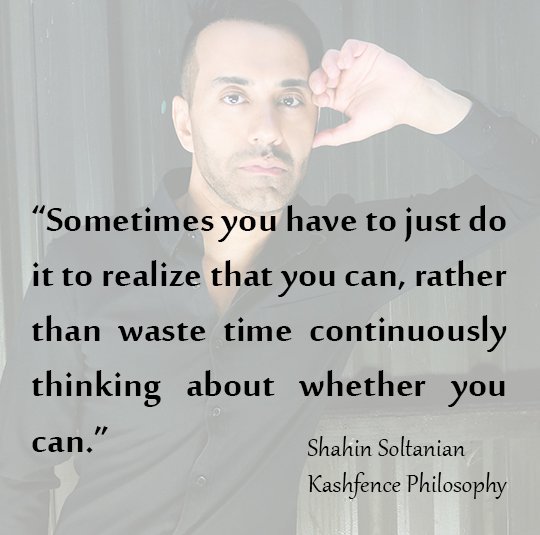
“Sometimes you have to just do it to realize that you can, rather than waste time continuously thinking about whether you can.”
Dr Shahin Soltanian
Kashfence Philosophy
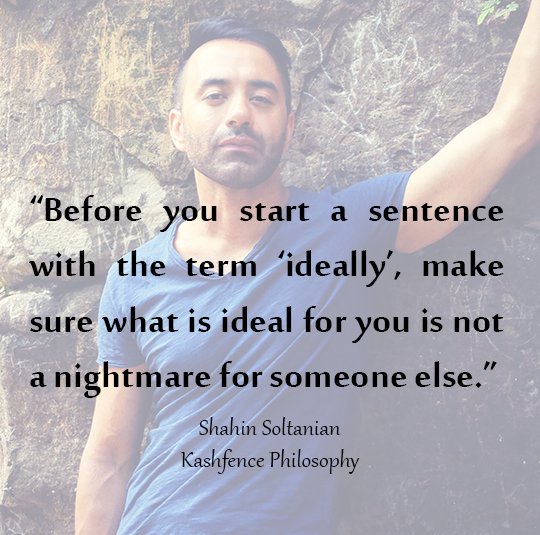
“Before you start a sentence with the term ‘ideally’, make sure what is ideal for you is not a nightmare for someone else.”
Dr Shahin Soltanian
Kashfence Philosophy
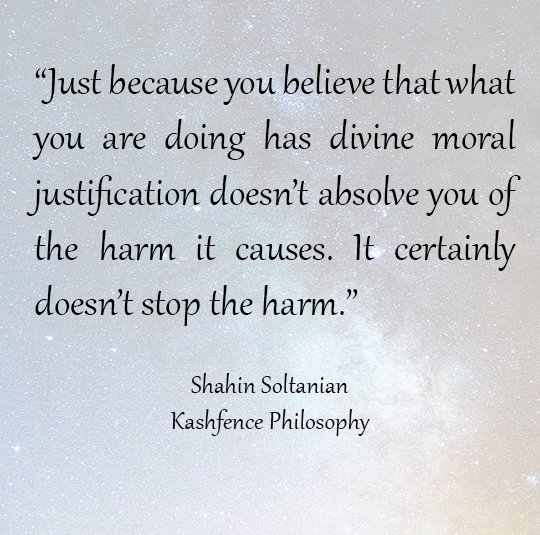
“Just because you believe that what you are doing has divine moral justification doesn’t absolve you of the harm it causes. It certainly doesn’t stop the harm.”
Dr Shahin Soltanian
Kashfence Philosophy






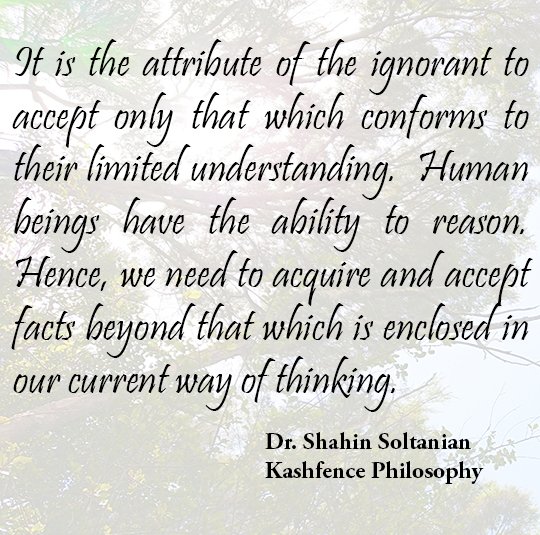
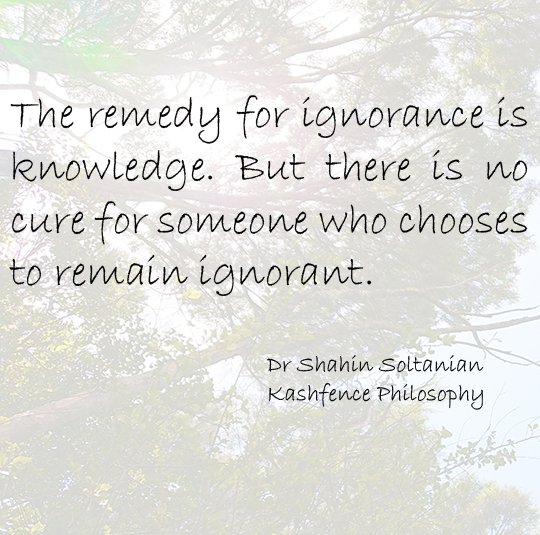
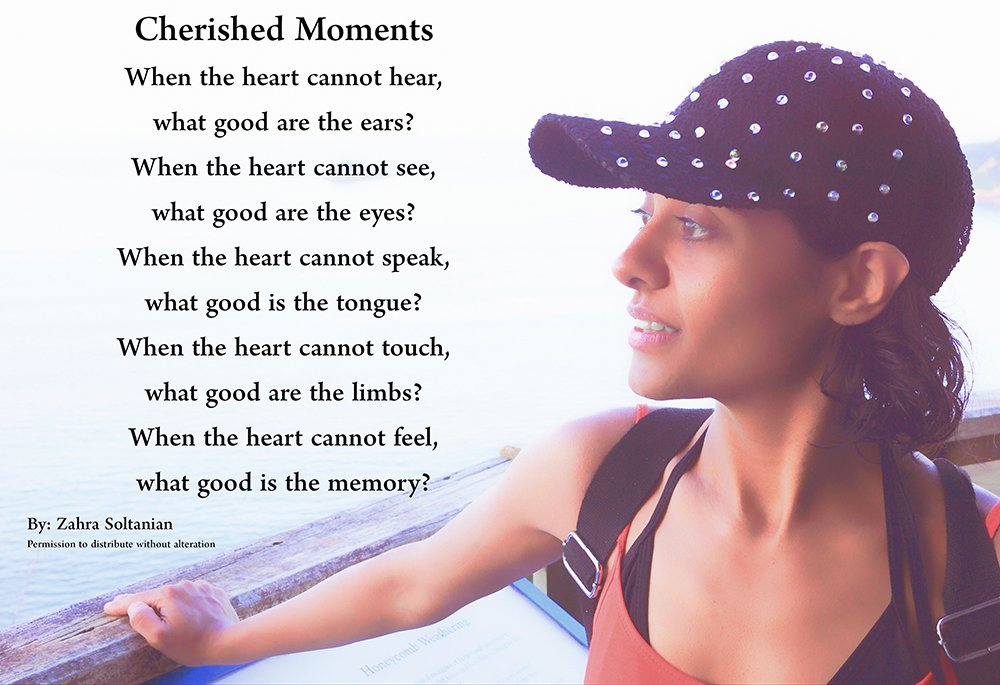

The Nightingale and the Jungle Fire
The following tale has in some way been mentioned in different world mythologies. The following novel version takes into consideration the main moral of the story.
Due to a lightning incident parts of a jungle had caught fire. In the midst of all the animals a single nightingale was attempting to put out the fire. It would take a drop of water with its beak, take it towards the fire and drop it at the corner. It would only drop the water at the corner of the fire that had engulfed part of the jungle because it was too hot for the nightingale to fly over it. It repeatedly did this until the other animals with a condescending tone said to the nightingale, “What use is it? You are too small and the water you carry too little to make any difference. You can never put out the fire at this rate.”
The nightingale turned to them and said, “You are absolutely correct. However, this is to the best of my ability. I am making the utmost effort according to what I am capable so that I don’t feel like I have done nothing. Maybe if everyone else also did what they are capable of or made any effort then we could all put out this fire.”
The moral of the story is that everyone is responsible for their own actions and whether they will choose to do nothing or be an active part of making a change for the better. Things might not change with the action of one person but maybe that one person can be an example to inspire others to also make an effort.
Kashfence Philosophy
Fable of the Farmer, his Father and their Donkey
There is an ancient fable that attempts to explain what would be the result of basing your life on other people’s opinions. The story is not necessarily intended for the purpose of discouraging a person from listening to and accepting beneficial advice and constructive criticism. Rather, it can be used to represent the idea that if someone changes the way they are doing something only for the reason of pleasing others, especially with so many different opinions, it will end with undesirable consequences. There will always be someone who disagrees or will pick on something to criticize. It could also be used to explain the consequences of criticizing others without a good reason other than one’s personal arbitrary opinions. The story is narrated in many different cultures in slightly different variations. The following is one version:
There was farmer that didn’t have much wealth but his farm and one donkey. His old father lived with him and his family. Every once in a while the farmer and his father would take their crops to town to sell in the farmer’s market. The market was about half a day’s journey. So the farmer stacked up his donkey and with his father went towards the farmer’s market. Both he and his father were walking beside the donkey when they were passing a village. The people of that village started talking and said, “Look at those two! They are both walking when they have a donkey to carry them. Why doesn’t one of them just ride on the donkey? They must not be very intelligent.”
The farmer and his father felt ashamed that their intelligence was questioned. The farmer told his old father to sit on the donkey instead of walking so that he can bare the long journey. He walked beside the donkey during their journey towards the farmer’s market. On the way to the market, they were passing a village. The villagers started talking about them saying, “Look at that father! How can he sit on the donkey while his son looks tired while walking? What kind of a father is he?!”
So the father and the son felt ashamed and decided to switch places. The son started riding the donkey whereas the father walked alongside. While passing another village, the residents of that village started talking saying, “Look at that boy! He is riding on the donkey with no care in the world when his old father who has worked all his life to bring him up has to walk. What kind of a son is he?”
So the father and the son felt ashamed again and decided it was better if they both rode the donkey and in this way no one can criticize them. When they were passing the next town on their way to the market the residents of that town started talking and saying, “Look at those cruel people! They are both riding that donkey with their crop on its back. Don’t they care at all about its welfare?”
Fed up with all the criticism they decided to carry the donkey instead. They used a stick and tied the donkey with all their crops and started carrying the donkey and the crop when they passed another town. The people of that town started mocking them saying, “Look at those idiots! They are carrying the donkey instead of the donkey carrying them. How stupid can you get?!” They were halfway through a bridge and upset about what had occurred until that time. Trying to put the donkey down so that the mocking stops the donkey and the crops slipped from their hands and fell of the bridge and the donkey died. They were left without a crop and with no donkey. On that day they realized that changing the way a person does things just for the purpose of pleasing everyone else will not have a good outcome.
Kashfence Philosophy
Health-T Publications
This website is intended to inform anyone interested in the Kashfence Philosophy and provide information and contact needed by the world Kashfenci community for propagating the Kashfenci thought.
The site is run by the Kashfence Trust, registered as a charity in New Zealand. Kashfence Trust also operates Kashfence Trust Publications and Productions and Health-T Publication.
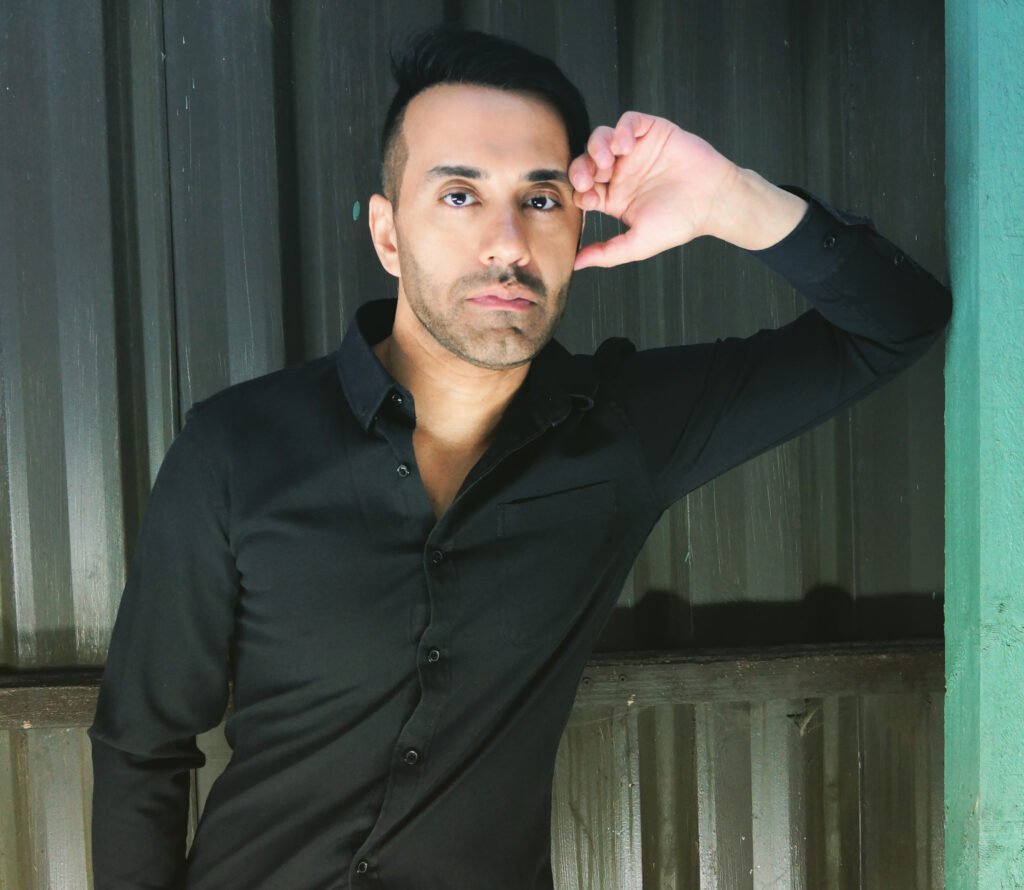
Founder of Kashfence Philosophy Dr. Shahin Soltanian has a PhD from the University of Auckland in philosophy. He has studied and researched the philosophy, theology, history and legal frameworks of many religious teachings and traditions. He spent a good portion of his life researching foundations of religious thoughts, reasoning provided by polemics of various different religions for their tenets of faith and the principles and legal frameworks of various religious laws. His main goal for his research was always to find out the truth. Dr. Soltanian founded and named the Kashfence Philosophy for those who believe in God but do not see the necessity of adopting a religion. Kashfence Philosophy provides the framework and organization for living one’s life without religion or divine commandments.

Zahra Soltanian is a trustee of the Kashfence Trust. She manages the organization and operation of the trust’s activities and its financial aspects. She is interested in women’s rights, freedoms and health. She can also communicate in four languages.

Ali Soltanian Fard Jahromi is the programs administrator for the Kashfence Trust. He is also responsible for the this site’s smooth running, SEO and social media and web activities. Other than his charitable work for Kashfence Trust, his other activities include software development, 3D and CGI art, animation, film production and game development.
Kashfence Philosophy Annual Celebrations
By: Dr Shahin Soltanian
Start Your Kids on Good Eating Habits
By: Dr Shahin Soltanian
Read online (link 1): Medium
Read online (link 2): Blogger
How to Integrate Exercise into a Busy Lifestyle
By: Dr Shahin Soltanian
Read online: Medium
Weight Maintenance
By: Dr Shahin Soltanian
Read online (link 1): Medium
Read online (link 2): Blogger
Healthy Cooking Recipes with Red Meat
Read online (link 1): Medium
The Kashfence Philosophy (Discovering through Rational and Scientific Analysis)
By: Dr Shahin Soltanian
Read online: Google Books/Play
Buy paperback/Kindle: Amazon
How the Religious Concepts of the Afterlife Devalue Human Life
Google Play Books Link
Google Books Link
Medium Link
Internet Archive Link
Spinoza’s Pantheism
By: Dr Shahin Soltanian
Read online: Google Books/Play
Buy paperback/Kindle: Amazon
Eat Healthy, Be Healthy
Read online: Google Books/Play
Buy paperback/Kindle: Amazon
Health-T Publications
Kashfence Philosophy is the doctrine that maintains rational and scientific reasoning is the basis for a happy and moral life. The word Kashfence is comprised of the word ‘Kashf’, meaning to discover in some languages, with the suffix ‘ence’ which denotes a quality, an action or result. Together ‘kashf’ and ‘ence’ create the original word Kashfence intended to capture the essence of discovering through rational and scientific reasoning and analysis. The essence of Kashfence Philosophy is for every person to discover through rational and scientific reasoning.
Kashfence Philosophy is not a religion but a philosophical basis and doctrine for living. According to the Kashfence Philosophical thought a person is capable of discovering through rational and scientific reasoning not only information about the world but also moral principles. Like the scientific domain the ability to discover moral principles and laws that govern society become better evolved and more advanced through peaceful dialogue that takes place between people as long as the underlying principle is rational and scientific reasoning.
According to Kashfence Philosophy there exists an unlimited God that created the entire world of being. However, God has not ‘revealed’ anything to human beings. The ability to reason is the best tool God has given every person to discover not only scientific principles but also all other principles including any basis for moral and legal opinions.
Explore the site for more information about Kashfence Philosophy.